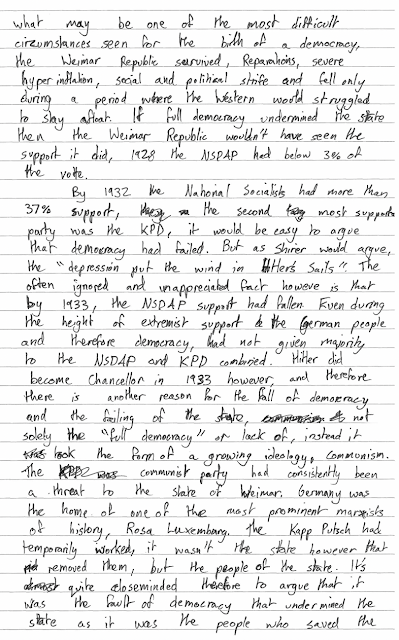From the May 2012 PAPER 2TZ1
From the markscheme:
This will be a popular question as many candidates will have studied this topic in relation to the rise of Hitler. This should not be seen as a question on the rise of Hitler but on the problems of the Weimar Republic. As this is a “ to what extent” question, candidates may introduce other factors to explain the collapse of the Weimar Republic, such as the effects of the Great Depression. Responses must be well-focused and analytical. A simple list of problems or a narrative on the rise of Hitler will not score well. Candidates could begin by explaining what they understand by the term, “full democracy”. The areas to consider may include: universal suffrage; proportional representation which enabled a wider representation of political ideas but often required the formation of coalitions to govern. Coalitions could, however, prevent decisive actions in times of crisis as seen in 1930. The free and open society alienated many traditionalists who were offended by the liberal nature of the new constitution. The plethora of political ideas that flourished could be seen as positive but also as a negative when different factions resorted to violence to pursue their ends. Candidates may also suggest that, because of Article 48, Weimar was not a “full democracy”. The question asks “to what extent” and so other areas to consider could include the following: the enduring unpopularity of the Versailles settlement; economic problems caused by the war; the severe economic dislocation of the 1923 inflation; the death of Stresemann in 1929, as he had been an important coalescing influence on Weimar politics; the effects of the Great Depression that contributed to the increased popularity of extremist attitudes on the Right and the Left; the anti-democratic values and poor judgment of certain individuals such as Von Papen, Von Schlei cher; the waning powers of President Hindenburg. In addition the continued existence of many anti-democratic elements within the army, the police, the bureaucracy and the legal profession undermined the support for the regime, particularly in times of crisis.
In-class timed essay





